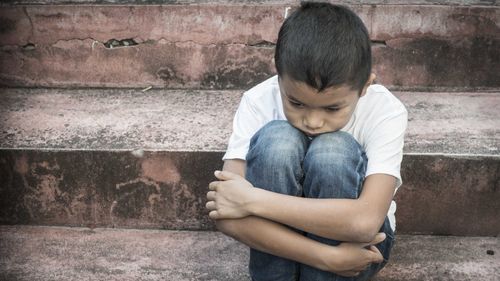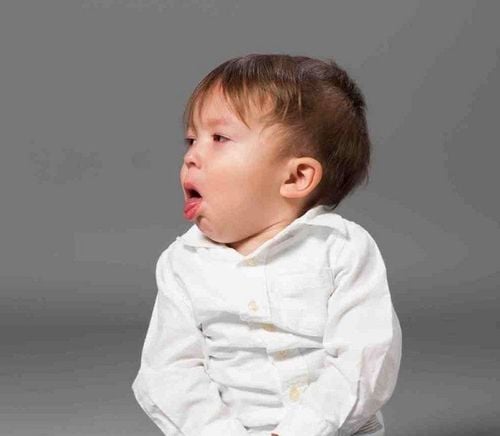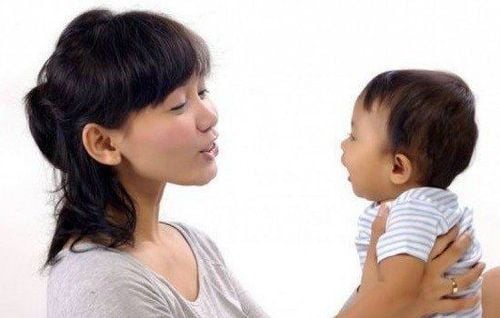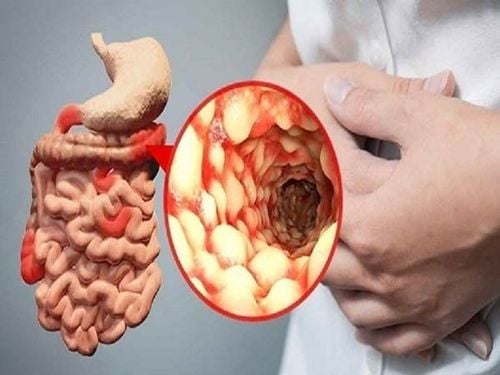This is an automatically translated article.
The article was consulted with - Doctor Le Thu Phuong - Pediatrician - Neonatologist - Department of Pediatrics - Neonatology - Vinmec Hai Phong International General Hospital.1. Child's behavior of hitting the wall
It sounds weird, but the fact that banging on the head of babies and toddlers is actually a normal behavior. Some children do this around nap time or before bed, almost as a self-soothing technique.Although it is a fairly common habit, it makes many parents feel scared and worried. It is natural because many parents think that banging the head can cause brain damage? Or could this be a sign of an illness? Could it cause other injuries? Or is the child angry?
Head banging can take many different forms. Some children hit their heads only when lying face down on the bed, then bang their heads repeatedly against pillows or mattresses.
However, some babies may hit their head against the wall, the railing of the crib, or the back of a chair.
Some children while banging their heads may swing their bodies, and others whine or make other noises.
However, the most important thing to know is that head banging is usually not a cause for concern, especially if it only happens during nap time or before bedtime.
The habit of banging heads and walls can start to form when babies are 6-9 months old.

2. What are the causes of head hitting the wall in children?
Understanding why your baby is banging his head can help you calm him down. Here are the possible causes including:2.1. Sleep-related rhythmic movement disorder
Interestingly, the habit of banging your head against the wall often appears just before a child falls asleep. It looks painful, but in fact, head banging is a way for some children to self-soothe or calm themselves.This is similar to the way some babies rock or shake their legs at bedtime, or how some babies like to be rocked while sleeping. In a word, head banging is a form of self-comfort, which often leads to drowsiness.
Of course, the pounding sound at night can startle you. But resist the urge to run in and rescue the child. As long as the child is not at risk of injury and that is the most important consideration here - let the child continue the behavior if it is not dangerous. This will only last for a few minutes, until the baby goes back to sleep.
2.2. Some development problems
Sometimes, however, head banging is a sign of a developmental condition, such as autism, or it can indicate psychological concerns.Observe the timing and frequency of head impacts to distinguish rhythmic movement disorder from a developmental problem.
As a general rule, if the child is healthy and shows no signs of a developmental, psychological or neurological condition - and head banging occurs only before sleep - then it is probably an arrhythmia very typical.
Also, if head banging is accompanied by other symptoms, such as delayed speech, emotional outbursts or poor social communication - it could be a different problem. You need to take your child to see a pediatrician to rule out an underlying condition.
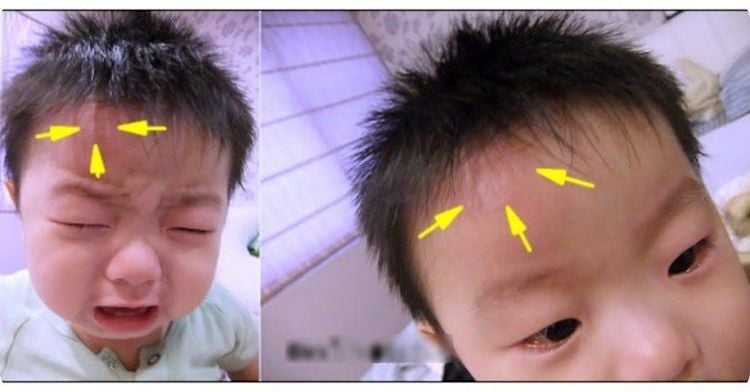
3. Solutions to cope when children bang their heads against the wall
While most head banging is normal and not a sign of a developmental problem, seeing or hearing your child banging their head can be stressful. Instead of being frustrated, here are some ways to help you cope when your child does this behavior:3.1. Ignore this behavior
This is easier said than done. Just know, though, that if you react in a frenzy by holding your baby or putting him to sleep in your bed, he'll use the sound of his head banging as a way to get your attention in a different way. of children. However, if you show no interest, this behavior may only last a few minutes. Only ignore behavior if there is no risk of harm to the child.3.2. Reposition the crib
Even if a child is not at risk of head injury, head banging can be loud and disrupt the rest of the home. You can move the crib away from the wall. This way, the child cannot hit his head against the wall.3.3. Prevent the risk of injury
If you are concerned about your child injuring himself, place a mattress along the head of the bed. You can also install handrails on your toddler's bed to prevent them from falling when they hit their heads. These actions are only necessary if there is a risk of injury to a child.Remember that you should only put extra pillows in an older child's bed. Experts at the American Academy of Pediatrics assert that while a baby or toddler is still sleeping in a crib, do not put extra pillows, blankets, etc. to reduce the risk of sudden infant death syndrome (SIDS). SIDS).
You need to watch your child bang his head against the sauce and take him to the doctor if you suspect a developmental or other problem in the child. Especially for children who bang their heads against the wall during the day or when they are not sleepy.
You should also take your child to the doctor if you notice other symptoms such as speech delay, poor head control or clumsiness to rule out other problems. Your doctor will evaluate, make a diagnosis and appropriate treatment.
4. What should you do when your child bangs his head against the wall?
4.1. Give your child your attention - but not when he's banging his head
Make sure your child gets lots of positive attention from you when he's not banging his head. However, if your child still bangs his head to get your attention, try not to yell or speak harshly to him. Even if you can't completely ignore the behavior, don't scold or punish your child for it. Your child is too young to understand the situation and your yelling may only make the problem worse and worse.4.2. Protect your child from injury
Check all screws and bolts on your baby's crib once a month or more for baby safety.Do not put pillows or blankets in your baby's crib as these can cause suffocation. If you want to use barriers on your baby's crib to help relieve the pain of hitting their head, make sure they are sturdy and fastened to the crib railing, so that your baby can't get in.

4.3. Try not to worry
Your child may get a bruise or two, but don't worry - head banging is often a "self-regulating" behavior. This means that children are unlikely to hit themselves in the head hard enough to cause serious injury. Children know their pain threshold and will stop if they feel pain.4.4. Direct your child to other activities
You should help your child find other activities for his or her love of rhythm. Experts often recommend dancing and drumming or clapping to music with your child. You can also try putting a music player in your child's room to give him comfort with a steady rhythm. You need to make sure that your child also gets plenty of exercise during the day to help burn off some of the energy.4.5. Start another routine before going to bed
If your child bangs her head against the wall as a way to lull herself to sleep, try establishing another bedtime routine for her. Taking a warm bath, telling a story, or singing a soothing song can help. You can take a few minutes before bed to rub your baby's back or stroke her forehead. You can play some soft music before the baby goes to bed.If your child hits his or her head against the wall several times a day or continues to bang it even though they are hurting themselves, you should take your child to the doctor. Although uncommon, head banging can be linked to autism and other developmental disorders, which become more apparent during the toddler and preschool years.
Children with autism often do not open up to people. They are often disinterested in physical contact with their parents and do not seem to look directly at others. If you notice that your child is losing physical, language, or other skills that he or she has acquired; if the child becomes increasingly withdrawn; or if your child is consistently delayed in reaching general developmental milestones, see a doctor.
With the desire to better care for the mental health of adults and children, Vinmec International General Hospital officially put into operation the Clinic of Regenerative Medicine and Educational Psychology with services examining, detecting and treating autism with psychological methods, music, meditation, yoga... Vinmec is also conducting research on stem cell transplantation to treat autism with many positive results.
Please dial HOTLINE for more information or register for an appointment HERE. Download MyVinmec app to make appointments faster and to manage your bookings easily.
Article reference source: healthline.com, babycenter.com




